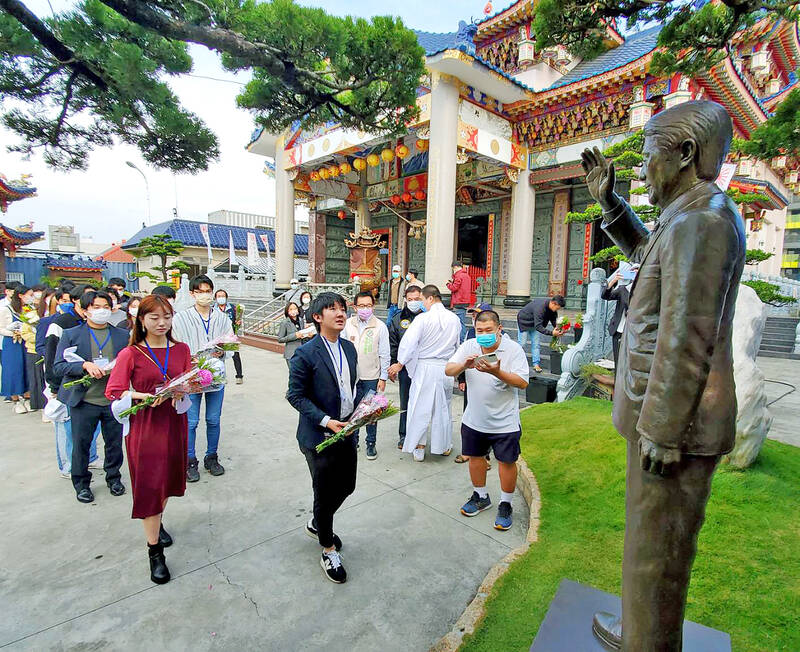Japanese students yesterday placed flowers at the base of a statue of former Japanese prime minister Shinzo Abe in Kaohsiung in an act of friendship between Japan and Taiwan.
The statue, which was unveiled in September last year, is displayed in a garden of remembrance created by Hongmaogang’s (紅毛港) Baoan Temple (保安堂) in Kaohsiung’s Fengshan District (鳳山) in memory of him.
The 21 Japanese students are recipients of a scholarship to study in Taiwan provided by the Friends of Shinzo Abe Association in Taiwan with the money left from the funds it raised to purchase an advertisement in Japanese daily Sankei Shimbun in July.

Photo: Chen Wen-chan, Taipei Times
Donations from 175 Taiwanese businesses, groups and individuals contributed to fundraising that paid tribute to the longest-serving prime minister in modern Japan, who was fatally shot during a campaign rally on July 8 last year, the association said.
Yeh Chien-yang (葉建揚), the association’s founder, said it selected 25 students from about 50 applicants for the scholarship, but four of them were unable to join the trip.
The scholarship provides an opportunity for students to travel to Taiwan and see how people recall Abe fondly, and to further cement the friendship between Taiwan and Japan, he said.
The students, aged from 18 to 30, visited Baoan Temple, the Kaohsiung City Government and the city council yesterday.
The temple is the only place that worships Japanese navy officers in Taiwan, temple president Chang Chi-hsiung (張吉雄) said.
Haruka Yoshinaka, who is studying at the Graduate Institute of Business Administration at National Taiwan University (NTU), started learning Mandarin when she was a sophomore and speaks fluently.
After making friends at international exchange activities at her university, she said she found that Taiwanese are passionate and tolerant, adding that she would like to live in Taiwan after she graduates.
The statue moved her, she said, adding that Abe’s death was shocking, but she was thankful to see Taiwan doing so much for him.
Abe helped promote the sale of Taiwanese pineapples, and said that “a Taiwan emergency is a Japanese emergency,” Yoshinaka said.
He arranged vaccine donations to help Taiwan with COVID-19 prevention efforts, she said, adding that she would like to follow in his footsteps and continue his efforts.
Naohiko Nakayama, a senior student in the Department of Political Science at NTU, said he was surprised to see a statue of Abe in a foreign country, and was moved by Taiwan’s love for Japan and Abe.
Having met the former prime minister in person twice, he said that “the charm and posture of the statue are very similar to Abe.”
Asked whether Japan is considering where to erect a statue of Abe, he said that it would provoke heated public debate, as Abe’s state funeral was a highly debated affair.
The parliamentary delegation from Japan’s Liberal Democratic Party that visited Taiwan last month showed Japanese lawmakers’ support for the nation, he added.

Taiwan has received more than US$70 million in royalties as of the end of last year from developing the F-16V jet as countries worldwide purchase or upgrade to this popular model, government and military officials said on Saturday. Taiwan funded the development of the F-16V jet and ended up the sole investor as other countries withdrew from the program. Now the F-16V is increasingly popular and countries must pay Taiwan a percentage in royalties when they purchase new F-16V aircraft or upgrade older F-16 models. The next five years are expected to be the peak for these royalties, with Taiwan potentially earning

STAY IN YOUR LANE: As the US and Israel attack Iran, the ministry has warned China not to overstep by including Taiwanese citizens in its evacuation orders The Ministry of Foreign Affairs (MOFA) yesterday rebuked a statement by China’s embassy in Israel that it would evacuate Taiwanese holders of Chinese travel documents from Israel amid the latter’s escalating conflict with Iran. Tensions have risen across the Middle East in the wake of US and Israeli airstrikes on Iran beginning Saturday. China subsequently issued an evacuation notice for its citizens. In a news release, the Chinese embassy in Israel said holders of “Taiwan compatriot permits (台胞證)” issued to Taiwanese nationals by Chinese authorities for travel to China — could register for evacuation to Egypt. In Taipei, the ministry yesterday said Taiwan

‘LIKE-MINDED PARTNER’: Tako van Popta said it would be inappropriate to delay signing the deal with Taiwan because of China, adding he would promote the issue Canadian senators have stressed Taiwan’s importance for international trade and expressed enthusiasm for ensuring the Taiwan-Canada trade cooperation framework agreement is implemented this year. Representative to Canada Harry Tseng (曾厚仁) in an interview with the Central News Agency (CNA) said he was increasingly uneasy about Ottawa’s delays in signing the agreement, especially as Ottawa has warmed toward Beijing. There are “no negotiations left. Not only [is it] initialed, we have three versions of the text ready: English, French and Mandarin,” Tseng said. “That tells you how close we are to the final signature.” Tseng said that he hoped Canadian Prime Minister Mark Carney

POSITIVE DEVELOPMENT: Japan and the US are expected to hold in-depth discussions on Taiwan-related issues during the meeting next month, Japanese sources said The holding of a Japan-US leaders’ meeting ahead of US President Donald Trump’s visit to China is positive news for Taiwan, former Japan-Taiwan Exchange Association representative Hiroyasu Izumi said yesterday. After the Liberal Democratic Party’s landslide victory in Japan’s House of Representatives election, Japanese Prime Minister Sanae Takaichi is scheduled to visit the US next month, where she is to meet with Trump ahead of the US president’s planned visit to China from March 31 to April 2 for a meeting with Chinese President Xi Jinping (習近平). Japan and the US are expected to hold in-depth discussions on Taiwan-related issues during the